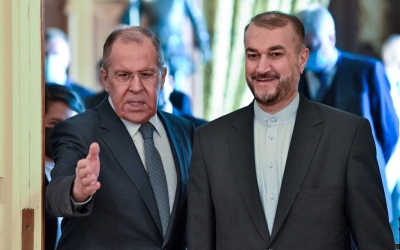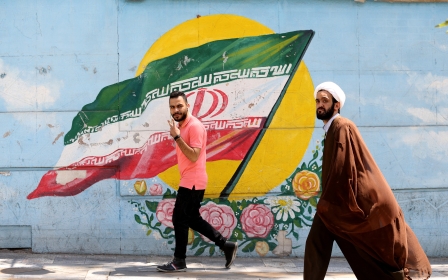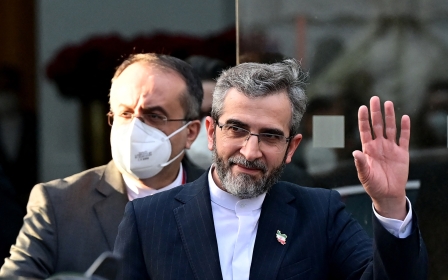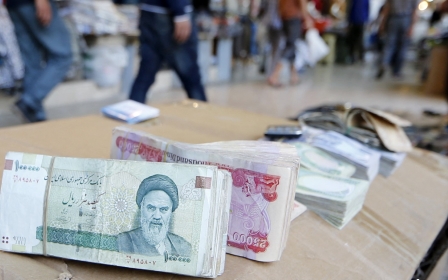Iran nuclear talks: Russia's negotiator rubbing Tehran up the wrong way
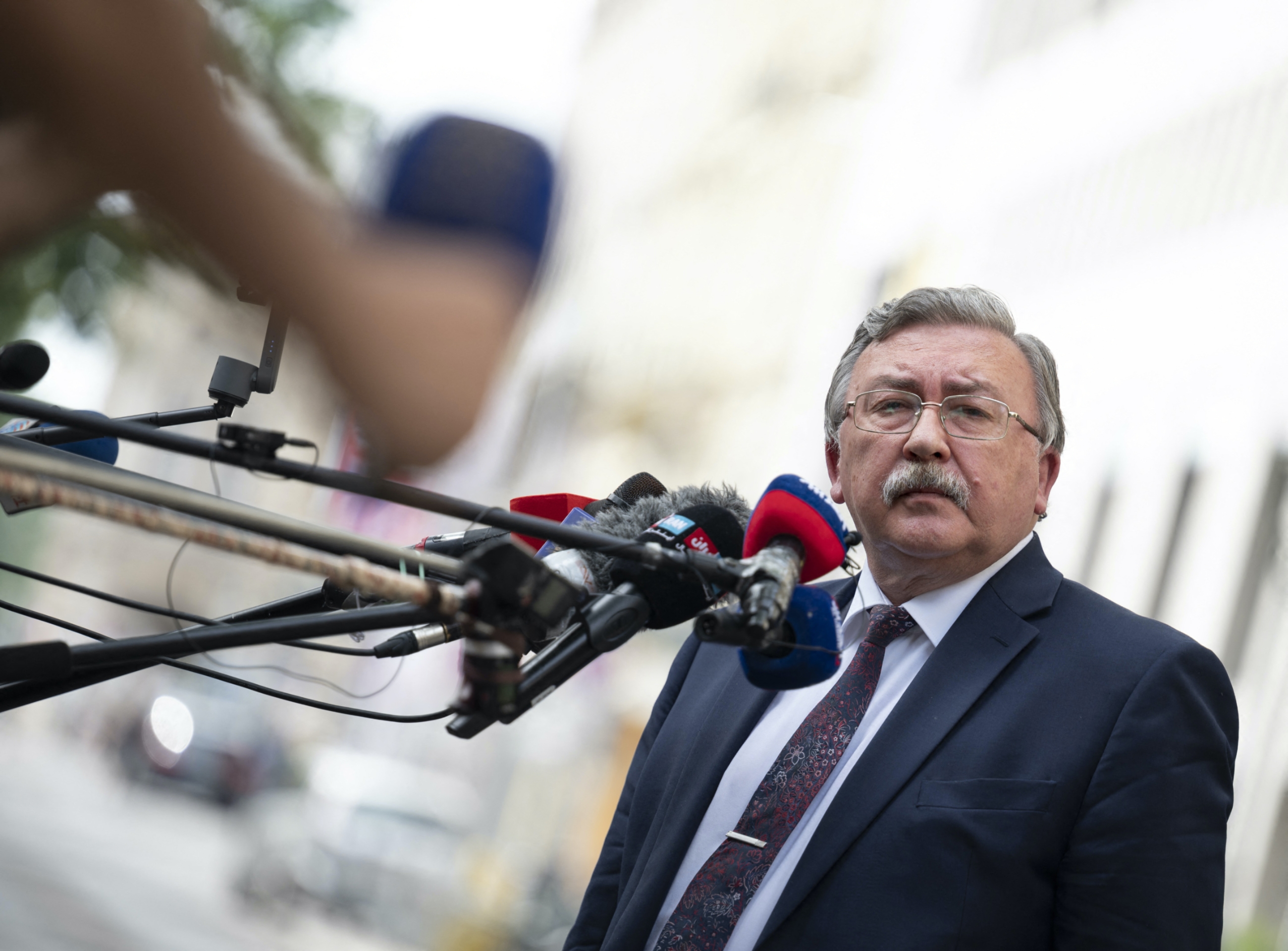
Iranians have grown sensitive to Russia’s prominent role in the talks for the revival of the 2015 nuclear deal, believing its lead negotiator has usurped Iran's own representative in Vienna.
The name Mikhail Ulyanov is now a famous one in Iran. Famous, but not popular.
Ulyanov is Russia's permanent representative to the international organisations in Vienna. He leads the Russian negotiation team in the Austrian capital, where global powers are struggling to revive the deal after former US President Donald Trump’s unilateral withdrawal, and subsequent US sanctions, left it in tatters.
While Iranian negotiators rarely release detailed accounts of their meetings, Ulyanov is active on Twitter, publishing updates on the talks. In addition to his engagement with journalists, he even replies to ordinary people on the social media platform.
He has tweeted a picture of himself in a meeting with US Special Envoy for Iran Robert Malley, without any Iranian or foreign negotiators.
Iran’s officials say that by refusing to hold direct meetings with the US delegation in Vienna, they are humiliating Washington. Other Iranians, especially reformists, believe that Tehran is handing over the management of the talks to Russia's envoy.
Qorbanali Salavatian, a reformist social media user, addressed the hard-line government and parliament on Twitter, asking why the country doesn't negotiate with Washington directly.
“Should Mr Ulyanov continue negotiating instead of us?” Salavatian wrote.
Ataollah Hafezi, a reformist activist, held a survey on his Twitter page, asking who his followers thought Iran's lead negotiator was: Iranian foreign office diplomat Ali Bagheri Kani or Ulyanov.
Over 90 percent of approximately 500 people who took part in the survey said Ulyanov had taken Bagheri Kani's place.
'Russia is a competitor to Iran's gas exports, and naturally Iran's economic standoff could be in line with Moscow's goals'
- retired diplomat
In reaction to the criticism, Ali Bahadori Jahromi, a spokesman for President Ebrahim Raisi’s government, said on 11 January that Bagheri Kani is "Iran's only official representative in the talks" and "no other person or country represents Iran."
Meanwhile, a veteran Iranian diplomat believes that Russia benefits from Tehran’s tensions with the US.
“Russia is a competitor to Iran's gas exports, and naturally Iran's economic standoff could be in line with Moscow's goals. The Kremlin is one of the biggest supporters of Israel, and this point should not be forgotten in our relations,” the retired diplomat told Middle East Eye, on condition of anonymity.
The diplomat called on the Iranian government to stop relying on Russia and China in its foreign relations.
“These two countries are interested in continuing tensions between Iran and the United States,” he said. “I think the Russians still want to make Iran a tool to take advantage of their conflict with the West.
Historical roots of distrust
Some observers believe that it is history - particularly the infamous treaties of Gulistan (1813) and Turkmenchay (1828) - that means Iranians will always be wary of their neighbours to the north.
The Russo-Persian wars and those related treaties led to the separation of large tracts of territory - including Azerbaijan, Armenia, Dagestan and some parts of modern Turkey and Georgia - from Iran.
'They have already turned their backs on Iran in some cases and proved that they are ready to sell their partners down the river'
- Iranian history professor
Meanwhile, some of Moscow’s moves in the past decades have deepened Tehran’s mistrust. In the 80s, the Soviet Union ended up throwing its weight behind Saddam Hussein's Iraq during its eight-year long war with Iran.
More recently, there has been the repeated postponement of the delivery of the missile defence system S300 to Iran and the repeated delays in completing the Bushehr nuclear plant. Moreover, the silence of Russia in the face of Israeli attacks on Iranian positions in Syria has been felt by Iranians too.
The result is that these actions have led some in Iranian society to believe that Russia is always thinking of ways to bypass Tehran or sell it out.
“Our officials should not be very fond of Russia and make their decisions by relying on [President Vladimir] Putin,” a history professor at Islamic Azad University in Tehran told MEE.
“They have already turned their backs on Iran in some cases and proved that they are ready to sell their partners down the river.”
The professor, who wished to remain anonymous, said that the Russians treated Arab states the same way when they abandoned them during the 1973 Arab-Israeli War.
“Our officials’ love for Russia has gone too far, and, in a way, has caused our strategies to change somewhat," he said.
Ulyanov vs Zarif
In April 2021, not long before Iran’s June presidential elections, an audio file of then-foreign minister Mohammad Javad Zarif was leaked to the media.
As well as supplying controversial remarks on a number of issues, including Iran's Revolutionary Guard Corps (IRGC), Zarif made revealed the negative role played by Russia during the 2015 nuclear talks. He said Russia had done everything in its power to sabotage the negotiations and prevent a deal from being struck.
Since then, Iranians, who were already sceptical about Russia, have become fully confident that not only is Moscow not an ally, it is in fact always searching for a way to stab Tehran in the back. This sentiment has been clear during the current talks over salvaging a deal.
One Iranian even told Ulyanov on Twitter that Zarif was right about Russia’s negative role in the nuclear talks. Ulyanov shot back, mocking Zarif in a tweet described by many Iranians as insulting.
“You are free to continue to mislead yourself on the basis of comments made by another person under the influence of toothache, headache, or something else,” Ulyanov tweeted on 6 January.
The tweet prompted a wave of comments and tweets by Iranians in favour of Zarif, leading the Russian ambassador to later retract his statement, and also post a tweet congratulating the former foreign minister on his birthday.
Rahman Ghahremanpour, a foreign policy analyst, tweeted on 7 January that: “Ulyanov’s remarks are undoubtedly beneath the status of a diplomat who must keep his calm during the most difficult crises.”
At the same time, Hossein Marashi, a reformist politician, revealed that the former IRGC Quds Force commander Qassem Soleimani, who was killed in a US strike in 2020, had spoken critically of Russia and quoted him as saying, “God hasn’t created a more disloyal people than these [guys].”
However, hardliners have vehemently defended Iranian-Russian ties, attacking those who call for talks with the US. In this vein, Kayhan daily, the mouthpiece of hardliners, slammed Russia’s critics, describing them as Israel’s assets in Tehran.
'Wrong' perception of Moscow
A former senior Iranian diplomat believes Tehran’s leadership is making a mistake by letting other countries talk to the US on its behalf.
“Since the negotiations between Iran and the United States are indirect, the talks are conducted through intermediaries and each one of them is likely to include their own interests and aspirations when transmitting the messages between Tehran and Washington,” said the ex-diplomat, referring to Russia’s highlighted role in the talks.
“This will also prolong the negotiation process.”
'Russia and the US share a common goal in terms of the so-called danger of Iran becoming a nuclear power, and they want to coordinate their positions'
- Heshmatollah Falahatpisheh, former official
Moreover, Heshmatollah Falahatpisheh, the former chairman of Iran’s parliament foreign policy commission, told local media that, "based on a mistaken analysis, Iranian officials think that China and Russia are Iran's strategic friends... We have to admit that Russia sees Iran as an embankment and that is a fact.”
“Before the 1979 revolution, the United States saw Iran as an embankment against Russia, and after the revolution, Russians started seeing Iran as an embankment against the United States,” he went on.
On Tehran’s attempts to resist the US sanctions, Falahatpisheh said: "I witnessed Iran repeatedly negotiate with Russia to buy 100,000 barrels of oil a day from Iran at its own price and give goods in return, but the Russians did not accept.”
Meanwhile, speaking on condition of anonymity, a foreign policy expert told MEE that he does not believe that Tehran has itself named Russia its advocate in the talks, but still, he added, it is more logical for Iran to negotiate directly with the US, “without any concern.”
“Russia is a big and powerful country with complicated ties with the western world,” he said.
“Mr Putin once said that Russia would not act as a firefighter for Iran, which was a piece of advice to Tehran not to start a fire because Russia is looking for its own economic development and does not have time to waste its assets on Iran.”
The foreign policy expert stressed that “Russia and the United States share a common goal in terms of the so-called danger of Iran becoming a nuclear power, and while they have other disagreements, they want to coordinate their positions in this particular case against Iran.”
“We should be on high alert and not rely on anyone,” he added.
Middle East Eye delivers independent and unrivalled coverage and analysis of the Middle East, North Africa and beyond. To learn more about republishing this content and the associated fees, please fill out this form. More about MEE can be found here.


